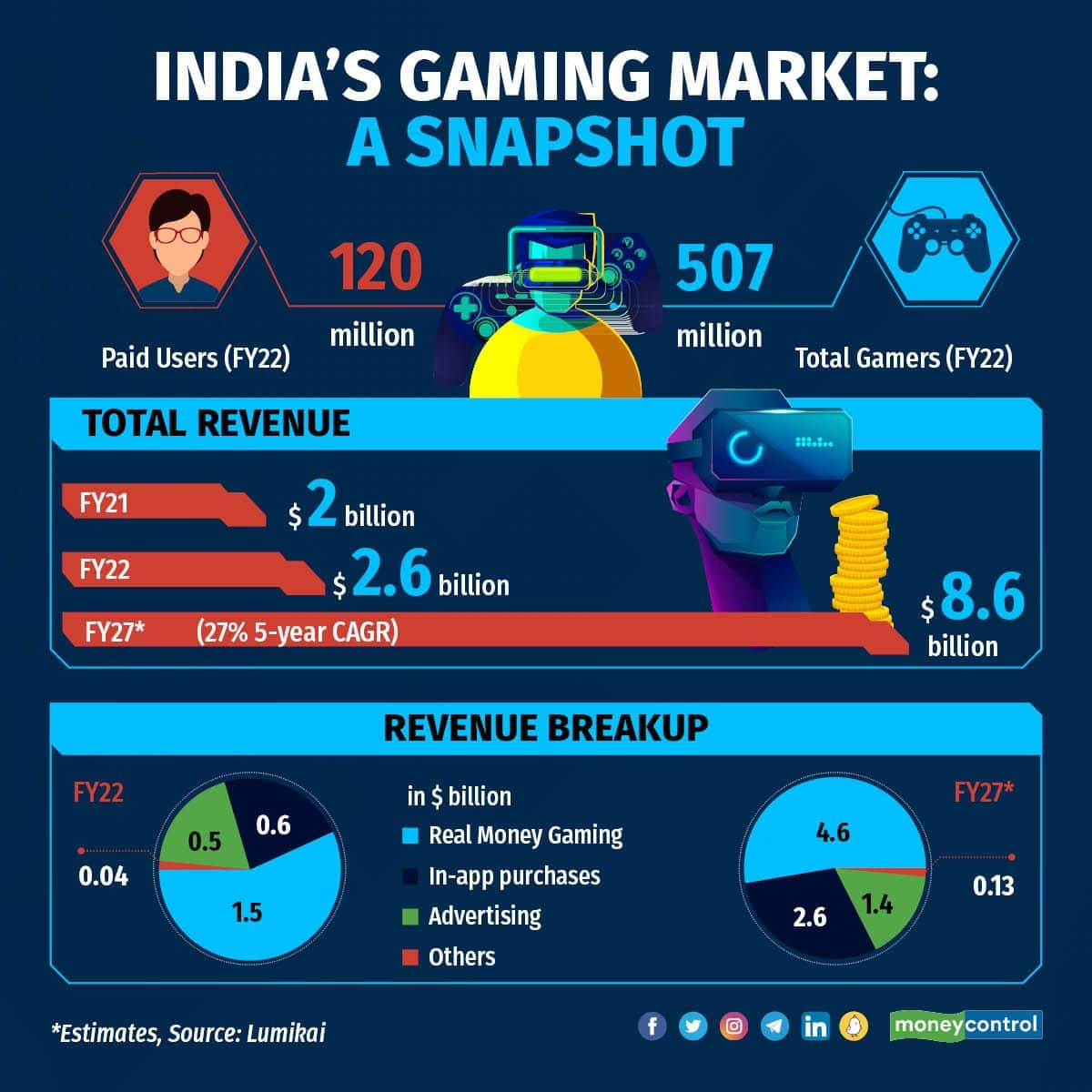



Indian gaming startup founders and industry associations have cheered the government's new gaming-related amendments to the IT Act 2021, saying they provide much-needed regulatory clarity and pave the way to accelerate growth in the burgeoning sector.
The Ministry of Electronics and Information Technology (MeitY) on April 6 notified these amendments to the IT Act 2021 after holding a public consultation in January 2023 as well as discussions with stakeholders, including gaming companies, industry bodies, players, and lawyers, among others.
Harsh Jain, co-founder and CEO of Dream Sports which owns India's largest fantasy sports platform Dream11, welcomed the regulations stating that they will "unlock the potential for our $20 billion Indian online gaming industry to significantly contribute to our Hon. Prime Minister’s vision of a trillion-dollar digital economy".
Hoping that clarity provided by the rules will bolster investor confidence in the sector, Trivikraman Thampy, co-founder of Games24x7, a skill-based gaming unicorn, said it will further opportunities for growth and innovation for legitimate domestic gaming platforms.
“With consumer protection and responsible gaming at the forefront, the regulatory framework will aid in arresting the proliferation of offshore and illegal gambling and betting platforms in India, which operate with little regard for consumer interest,” Thampy said.
What real-money gaming players say
Mobile Premier League co-founder Sai Srinivas termed the move a "watershed moment for the industry" as the rules recognise online gaming intermediaries and distinguish them from gambling.
These regulations come at a time when India's gaming sector has seen unprecedented growth in terms of app downloads and revenues as a result of pandemic-induced home confinement in recent years, which has led to Indian consumers becoming more comfortable spending money on mobile games.
WinZO Games co-founder Paavan Nanda termed the amendments as a "game changer" facilitating a level playing field for all games of skill.
Consumer interest
As per these amendments, MeitY will allow multiple SROs to determine whether a real-money game is permissible to operate in India or not. In the beginning, the government will notify three SROs but more can be notified later.
Rameesh Kailasam, CEO of industry body IndiaTech.org which represents founders of Indian startups and investors, said, "A strong consumer redressal mechanism protects users’ interest while SROs (self-regulatory organisations) provide oversight to ensure all legitimate formats across platforms operate.
At the same time, he felt that the rules give the much-awaited legal recognition across the country to the online real money gaming industry thus laying the foundation for its accelerated growth and reinforcing the direction for an important pillar in India’s techade.
Kailasam also said that the regulations provide the "much-needed cover for legitimate online real money gaming formats and insulate them from various interpretations states have had so far. They also give the much-needed guidance to states".
IndiaTech.org counts prominent Indian internet firms such as Zomato, Ola, Dream11, Meesho, Steadview Capital and Falcon Edge Capital among its key members.
Roland Landers, CEO of All India Gaming Federation, a skill-based gaming industry body, said these regulations will go a long way in promoting consumer interest while helping the industry grow in a responsible and transparent manner.
The regulations
These SROs would be a company registered under Section 8 of the Companies Act 2013 and its board of directors would comprise individuals, including a central government-nominated person who has practical experience in the field of public policy, public administration, law enforcement or public finance; an individual having special knowledge or practical experience in the online gaming industry; an educationist and an expert from the field of psychology, medicine or consumer education.
"We will let SRO decide what is addictive, what constitutes user harm. We are not going to prescribe any of it as it will evolve," Union Minister of State for Electronics and IT Rajeev Chandrasekhar said in a press briefing on April 6.
The SROs would also have an individual who is or has been a member or officer of an organisation dealing with the protection of child rights and a person having experience in promoting the interests of users of online games.
Rajan Navani, founder of digital entertainment and technology company JetSynthesys, said, "By setting up a framework of multiple SROs comprising diverse stakeholders, a strong foundation has been laid to give clarity to developers, investors and gamers on how this fast-growing industry can create opportunities for the Indian economy including jobs for the future," Navani said describing the rules as a step in the right direction to accelerate the sector's growth.
On the other hand, Thampi of Games24x7 felt that allowing multiple self-regulatory bodies will enable the industry to be "adequately represented according to the varying nature and operational models of online games".
 A snapshot of India's gaming market
A snapshot of India's gaming market
Distinctions in the type of games
The rules create a clear distinction between video games, real-money games (or skill-based games) where the transfer of money is involved and games where wagering is involved.
“You don't have to go to an SRO if you are only a gaming company, but only when there is money involved in the game,” Union minister Chandrasekhar said, adding, "We are laying out a basic principle that the moment an online game trespasses into involving betting and wagering, regardless of its core content, then it falls afoul of these rules."
As per the amendments, online gaming intermediaries, which enable users to access any permissible online real money game, would have to display a visible mark of verification of such online game by an online gaming SRO on its website and mobile app.
They would also have to inform the users on the know-your-customer (KYC) procedure followed for verifying the identity of the users of the online game, apart from the measures taken to protect user deposits and policies related to withdrawal or refund of deposits, manner of determination and distribution of winnings, fees and other charges payable by the user.
Lauding these amendments, Deepak Gullapalli, founder of skill-based gaming firm Head Digital Works, said the clear definition of real money and permissible games will be crucial in catalysing the growth of legitimate industry players. "This framework will allow us to innovate and operate freely while ensuring that the necessary guardrails are in place to safeguard the users," he said.
Easing compliance
That said, the new rules released have provided some relaxation in terms of compliance, with most of the obligations and compliance requirements kicking in only three months after the ministry notifies the three SROs. These SROs will also have to verify whether an online real money game is permissible or not within a period of three months.
Joy Bhattacharjya, director-general of the Federation of Indian Fantasy Sports (FIFS), said the move is expected to "put an end to the ambiguities that the industry was grappling with and lay the foundation for sustainable and responsible growth of the industry".
The potential
The country's gaming sector revenues increased from $2 billion in FY21 to $2.6 billion in FY22 and are expected to expand at a compound annual growth rate of 27 percent to $8.6 billion in FY27, according to a report by gaming and interactive media venture fund Lumikai.
"The constructive and consultative approach taken by the government in laying down these guidelines has resulted in much-needed clarity for the real-money gaming industry in India. We believe this will further galvanise the sector," said Salone Sehgal, founding general partner, Lumikai.
Central regulation
These amendments are likely the first step towards forming a central law to regulate India’s online gaming sector. On February 8, Union Minister of Electronics and Information Technology Ashwini Vaishnaw said in Lok Sabha that India should have a central law to regulate the online gaming sector.
“We as responsible lawmakers should come with a central Act, which basically has been drafted in consultation with everybody and that Act should be effectively regulating the online games and online gambling,” he said.
Industry executives have previously told Moneycontrol that a central regulation is crucial to fight the menace of illegal offshore gaming operators since a state law cannot be enforced against a foreign operator.
As per the new rules, gaming intermediaries cannot host any game that is not recognised as a permissible online game by a self-regulatory body. They also cannot publish any advertisement or surrogate advertisement or promotion of an online game that is not a permissible online game, primarily targeted at offshore betting portals.
Jay Sayta, a technology and gaming lawyer, said these amendments are expected to "curb the menace of illegal offshore betting and gambling websites and their surrogates that are openly flouting the law and advertising through various means".
They would also help in stopping promotional content of offshore betting websites and pave the way for swift blocking of domains and websites/apps engaged in illegal gambling or betting, he said.
The rules will eliminate the confusion between legitimate online gaming players and offshore betting websites, felt Jaya Chahar, founder of fantasy gaming app TFG.
The concerns
Sayta stressed that the rules continue to go beyond the scope of the parent legislation i.e. the Information Technology Act, 2000 and the legislative powers of the state to govern such online games remain.
"It is also not clear whether the rules framed under the powers to prescribe due diligence requirements for intermediaries (those providers which are not responsible for providing content) can be applied to online gaming platforms that actively decide and offer their own gaming content, in the manner that the central government is seeking to apply to them," he said.
The rules also do not clearly define online real money games to be games involving a predominant or substantial degree of skill and they do not clearly demarcate games involving a substantial degree of skill, which are legal and constitutional activities, as separate from games of chance or gambling/betting activities, he said.
Discover the latest Business News, Sensex, and Nifty updates. Obtain Personal Finance insights, tax queries, and expert opinions on Moneycontrol or download the Moneycontrol App to stay updated!
Find the best of Al News in one place, specially curated for you every weekend.
Stay on top of the latest tech trends and biggest startup news.